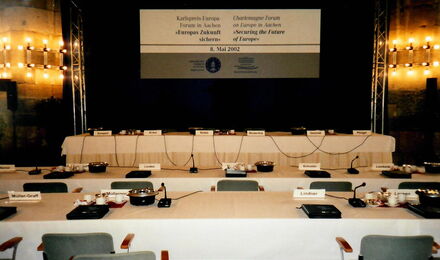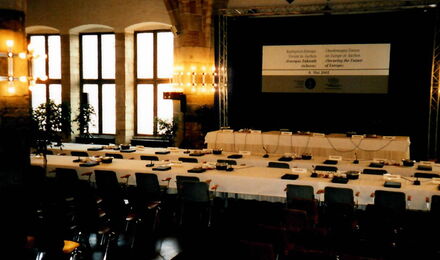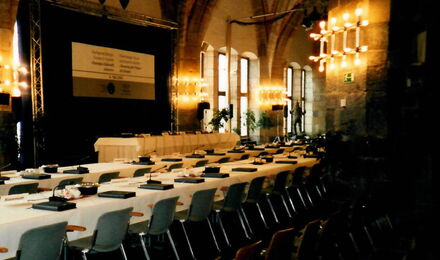Award of the International Charlemagne Prize of Aachen to the EURO - sponsored by the European Central Bank
I. It is the will of the initiators of the International Charlemagne Prize of Aachen that it should be awarded for outstanding achievements in the service of European understanding and co-operation, humanity and world peace. The prize honours the promotion of a united Europe in the political, economic and spiritual-cultural sense. Like no other step towards integration before it, the new currency, the euro, will foster identification with Europe. The EURO will thus make a decisive, epoch-making contribution to the growing together of the family of nations. The awarding of the International Charlemagne Prize of Aachen to the EURO – carried by the European Central Bank – also honours the achievements of all those personalities who, despite manifold resistance, held fast to the vision of a common currency for a united Europe and realised it. With the EURO, the Board of Directors of the International Charlemagne Prize honours a measure that has a stabilising effect on the Community, supports a common foreign and security policy and forms the basis for a coordinated economic and social policy as well as for other political fields of the Community. The introduction of the EURO thus marks a new stage in the process of European unification.
II. We owe the longest period of peace in our history to European integration. There may be many reasons why war and dictatorship, totalitarian ideologies and division have been overcome on the European continent and why peace, freedom, understanding and reconciliation have prevailed. However, without the central position occupied by the idea of European unification, this positive development would not have happened. European Economic and Monetary Union is a cornerstone of this united Europe. It is bringing our continent – with its many peoples and nations, languages and cultures – closer together than ever before. And this integration has come about of our own free will, in peace and freedom – a rare moment in the millennia-old history of Europe. When the Monetary Union was launched more than a decade ago, many thought it was an illusion. However, with the Maastricht Treaty and the establishment of the European Central Bank on 1 June 1998, it has been shown that the joint efforts in the second half of the 20th century have paid off. At the end of the century, the great visionaries have proved to be the true realists. No step towards integration since the founding of the European Communities has had such a profound impact on people's lives as the euro will have by the beginning of 2002 at the latest. When people in the Algarve and in Dublin, in Brittany and in Burgenland, in Lapland and in Sicily – to name just a few regions – pay with the same currency, they will literally be carrying Europe with them in their pockets, and they will be able to grasp with their hands that Europe is a community that has grown over time and that the euro is a symbol of this. The euro is the most convincing, pragmatic solution on the road to European unity in more than 1,200 years. By awarding the International Charlemagne Prize in 2002, we are recognising the conviction that the euro will give rise to a completely new sense of belonging within the Union. Throughout history, currencies have always been more than just a means of payment; they have always been and still are a piece of common identity and culture and an indicator of political, economic and social stability. And: stability isn't everything, but without stability everything is nothing. To get a realistic sense of the magnitude of the challenge, it is enough to note that ever since the signing of the Treaty of Rome and the birth of the European Community, the idea has always been to crown the single market with a single currency, with economic and monetary union. The unification process has by no means been straightforward. Many initiatives have failed to really advance integration. This applies to the action programme that the EEC Commission developed as early as the 1960s for the second stage of the customs union, as well as to the plans based on the Werner Report in 1970, when efforts were made to achieve greater stability in the face of the collapse of the Bretton Woods fixed exchange rate system. Serious progress was then made with the entry into force of the European Monetary System in 1979, with a zone of increasing monetary stability. The introduction of the euro, decided 13 years later in the Maastricht Treaty, is one of Europe's major responses to the globalisation of the world economy and to the ever-increasing global competition between economies. The monetary union increases price transparency and eliminates exchange rate risks between the participating states. This means: greater planning security; new business opportunities; the development of long-term business relationships that are not subject to the fluctuations of the currency markets; and finally: a large and efficient European financial market with an EU-wide gain in social and economic security. But the euro is not just a unit of account, it is a yardstick for values, and above all it has the power to create a sense of identity and perhaps even peace. And anyone travelling in future from France to Greece, from Austria to Finland, from Luxembourg to Portugal, from Belgium to Ireland, from Spain to the Netherlands or from Germany to Italy will experience a ‘piece of home’ beyond national borders thanks to the euro. The European Central Bank, with its President Wim Duisenberg, is the guardian of the stability of the single currency and will receive the International Charlemagne Prize of Aachen on behalf of the euro on 9 May 2002.
III. In awarding the International Charlemagne Prize of Aachen in 2002, the Board of Directors of the Prize hopes and expects that the common currency will bring the people of our continent even closer together, that the identity- and peace-building effect of the euro will exert an even stronger attraction on the states and nations that have not yet introduced the common currency and on those that do not yet belong to the community, and that the irreversible monetary union will be a decisive impetus for the completion of the political union.








